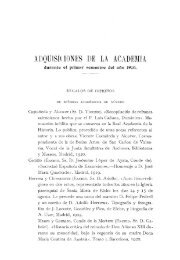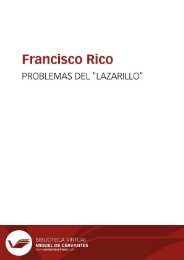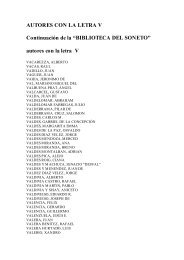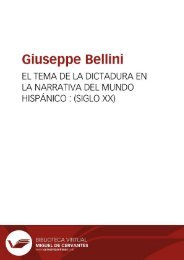You also want an ePaper? Increase the reach of your titles
YUMPU automatically turns print PDFs into web optimized ePapers that Google loves.
Anales galdosianos [Publicaciones periódicas]. Año XII, 1977<br />
that they are the inventions of <strong>Galdós</strong>, but in that they have created themselves into something they are<br />
not and function in a society structured on such fictions. In the same way that any novelistic creation<br />
is given life through language, José María's family's birth into a new social role is legitimized in its<br />
fictionality by the members' adoption of new linguistic signs (Lica > Manuela, Belica > Isabel, etc.).<br />
The purchase of titles of nobility is the crowning step in their creation of a fictional identity. Máximo<br />
himself, who is ostensibly -but only ostensibly- independent of his creator, is also only ostensibly<br />
independent of this society where the clock strikes eleven at the hour of five. But just as the failure of<br />
Nazarín's peculiar evangelism is a measure not simply of his ineptitude but of the spiritual sterility of<br />
nineteenth-century bourgeois society, so too is Manso's sense of uselessness and ultimate withdrawal<br />
an indictment of a society in which the gentle, the learned, and the morally pure have no place.<br />
Any judgment of Manso's nature that leaves his circumstance untouched falsifies the relationship<br />
between the two. Still, as we have shown, through the device of fictive autonomy <strong>Galdós</strong> distances<br />
the reader of El amigo Manso from Máximo and his bourgeois world. In doing so, he draws attention<br />
to the workings of the esthetic object that is at once his creation and his medium. He causes the reader<br />
to fasten not on the social signification alone, but on the novel as signifier. His endeavor, like any<br />
metalingual enterprise, is semiotic and epistemological at the same time: it ventures in the telling of<br />
the tale to unravel that tale's system of signs and to probe the nature of knowledge dressed as fiction. In<br />
this art that exposes itself, the child in us that is normally swept into the game of belief is suppressed.<br />
That level here is literally reserved for the child, as when Pepito María hides his face in terror at the<br />
sight of the devil on stage. We are pitched, rather, into a more sophisticated game for adults. In words<br />
that Ortega was to echo some forty-five years later, Manso exalts the child's ingenuous faith before the<br />
work of art over the analytical process: « ¡Ni qué cosa humana habrá que a tal análisis resista! Pero es<br />
una desdicha conocer el amargo placer de la crítica, y ser llevado por impulsos de la mente a deshojar<br />
la misma flor que admiramos. Vale más ser niño y mirar con loco asombro las imperfecciones de un<br />
rudo juguete » (XIV, 85). In this by no means rough-hewn plaything, <strong>Galdós</strong> has us not live the novel<br />
but view it as object, constrains us to become aware of ourselves as readers/players, and even edges us<br />
into a critical analysis of our awareness. In composing a novel that takes its own creation as its theme,<br />
<strong>Galdós</strong> joins a host of twentieth-century writers of metanovels, Proust, Gide, and Beckett among<br />
them. He makes a Pirandello play look much less astonishing than it did at first blush. He connects<br />
with the modern cinema's penchant for reflexiveness: Fellini's 8 ½ and Bergman's Persona come to<br />
mind immediately. lf these names seem to constitute odd company for the likes of Don Benito « el<br />
garbancero », one must keep sight of the fact that there is a difference between <strong>Galdós</strong> and the others.<br />
The nineteenth century's ever-increasing isolation of the artist from its social currents has pushed the<br />
116

















